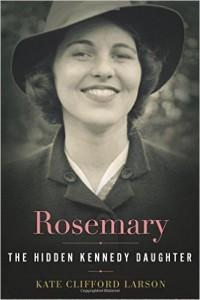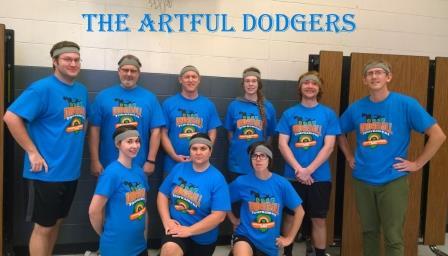Posted by Rachael on Tuesday, Nov 10, 2015
Over the weekend, the Library fielded a team for the Police Dodgeball Tournament to help raise money for the Special Olympics. Our team, The Artful Dodgers, had a lot of fun. Games were won and lost, and at the end of the day we brought in $400 to go towards helping athletes compete in the Special Olympics by paying for uniforms, training and hotel rooms, among other things.
 As team captain, I wanted to learn more about the Special Olympics, especially the history of the organization. As it happens, there's a fascinating new book at the library, Rosemary: The Hidden Kennedy Daughter by Kate Clifford Larson, about the life of Rosemary Kennedy, sister of Eunice Kennedy Shriver, who helped found the Special Olympics.
As team captain, I wanted to learn more about the Special Olympics, especially the history of the organization. As it happens, there's a fascinating new book at the library, Rosemary: The Hidden Kennedy Daughter by Kate Clifford Larson, about the life of Rosemary Kennedy, sister of Eunice Kennedy Shriver, who helped found the Special Olympics.
Rosemary Kennedy was the third child of Joseph Kennedy, Sr. and Rose Fitzgerald. Problems during her birth caused Rosemary to be deprived of oxygen for a prolonged period of time, which lead to her having intellectual disabilities. As a young child, Rosemary was sent to special schools, but as Larson recounts through Rosemary's own letters and notes, she struggled to fit in with her family and please her parents. As she grew older she began to act out, sometimes violently, and so a a decision was made to have Rosemary undergo a new kind of medical procedure called a lobotomy, with the hopes that it would help calm her moods. The procedure was a disaster and left Rosemary permanently disabled. She was placed in an institution in Wisconsin and remained there for decades.
The one bright spot in this story is how Rosemary's younger sister Eunice became inspired by her sister's tragic life and became an advocate for children's health and disability issues. Eunice lobbied her father and her bother, then President Kennedy, to fund research and establish the National Institute of Child Health and Human Development. In 1962 Eunice founded Camp Shriver, which eventually evolved into the Special Olympics.
Today, more than 4 million athletes are involved in Special Olympics sports training and competition in 180 countries. Programs are offered free of charge, so fundraising events, like the dodgeball tournament, are crucial for helping Special Olympians attend the games and compete.


Add new comment